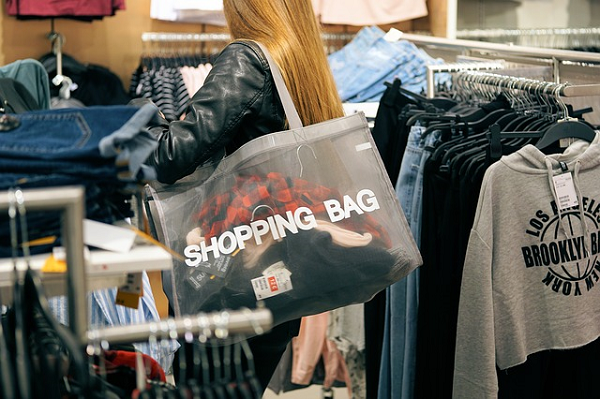
Fast fashion refers to the production and marketing of cheap, trendy clothes while encouraging consumers to buy them in large quantities all through the year.
Because I think fast fashion supports consumerism and is inconsiderate of the environment, I decided to buy rather fewer and better-quality clothes that last longer.
Due to so-called fast supply chain management, such well-known fashion brands as Zara, H&M, C&A and many others are capable of bringing out the newest fashion trends not only once per season but several times a season. In fact, usually there are new items coming out each week. In this way, they satisfy their customers’ thirst for shopping, which is these days more a form of entertainment than a necessity in developed countries and for middle-class and wealthy consumers. Criticisms of fast fashion include that it is based upon massive production of low-quality goods which are worn only for a short time and then thrown away. It is reported that more than 2,500 liters of water is needed to produce one T-shirt, so the (fast) fashion industry plays no small part in water and soil pollution and producing CO2. Moreover, cheap clothes are oftentimes produced in less-developed countries and factories where working conditions for employees are unsatisfactory.
Pojem rychlá móda odkazuje na marketing a produkci levného trendy oblečení, které pobízí spotřebitele k celoročním nákupům velkého množství zboží.
Protože si myslím, že rychlá móda podporuje konzum a je bezohledná k životnímu prostředí, rozhodl jsem se, že budu raději kupovat méně oblečení, které je ale kvalitnější a vydrží déle.
Díky tzv. rychlému řízení dodavatelského řetězce jsou známé módní značky jako Zara, H&M, C&A a mnoho jiných schopny přinášet nejnovější módní trendy nejen jedenkrát za sezonu, ale několikrát sezónně. Nové kousky se vlastně často objevují i každý týden. Tímto způsobem uspokojují hlad svých zákaznáků po nakupování, které je dnes pro bohaté spotřebitele a spotřebitele střední třídy v rozvinutých zemích spíše formou zábavy než nutností. Kritika rychlé mody upozorňuje masivní produkci zboží nízké kvality, které se nosí jen chvíli a vyhodí se. Je doloženo, že k výrobě jednoho trička je třeba více než 2500 litrů vody, takže průmysl (rychlé) módyse významně podílí i na znečištění vody a půdy a produkci CO2. Kromě toho, levné oblečení se také často vyrábí v méně rozvinutých zemích a továrnách, kde jsou pracovní podmínky zaměstnanců neuspokojivé.
English Editorial Services’ mission is to assist international businesses and organizations of all sizes to communicate clearly, correctly, and persuasively with their business partners and target audiences.
Simply subscribe to receive our Business Term of the Day at no charge to your inbox each business day, with explanation in English and Czech.



English Editorial Services’ mission is to assist international businesses and organizations of all sizes to communicate clearly, correctly, and persuasively with their business partners and target audiences.
Simply subscribe to receive our Business Term of the Day at no charge to your inbox each business day, with explanation in English and Czech.

